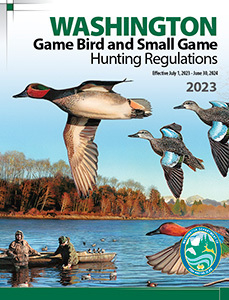Avian Influenza Facts
AVIAN INFLUENZA (BIRD FLU) is a viral illness commonly found in birds. Wild birds can carry a number of avian influenza viruses, many of which do not seriously affect them. Several different bird flu strains have been identified around the world, including Highly Pathogenic Avian Influenza (HPAI) strains, and spread quickly in all four flyways, including the Pacific Flyway during spring 2022. This strain of HPAI has been found in backyard poultry flocks, commercial poultry, wild waterfowl, and wild and captive raptors (hawks, falcons, etc.).
The risk to human health from avian influenza strains is believed to be minimal. However, it is important to note that:
- There have been no known cases of humans contracting the HPAI virus from healthy, free-flying wild birds anywhere in the world.
- There is no evidence that properly cooked waterfowl (or domestic poultry) can sicken people.
Citizens who observe sick birds or die-offs of wild birds should report it to WDFW's online reporting tool at wdfw.wa.gov/sickwildlife. Live bird tests focus on certain waterfowl and raptor species as HPAI seems to be impacting raptors and some waterfowl more than other previous strains of avian influenza. Hunter harvested birds will be tested during fall hunting seasons. Please cooperate with biologists if they should ask to test your harvested birds.

For Hunters
While it is extremely unlikely that hunters or people feeding wild birds could contract HPAI from wild birds, bird hunters who have domestic poultry or other birds at home, or who may visit domestic poultry markets or exhibitions (such as fairs), are asked to take special precautions to ensure that all equipment (boots, clothes, vehicles, dogs, etc.) are cleaned and disinfected to prevent the spread of diseases like HPAI.
The following precautions are recommended to reduce the risk of contracting any wildlife disease:
- Do not harvest or handle wild birds that are obviously sick or found dead.
- Wear disposable gloves while cleaning game or cleaning bird feeders.
- In order to protect raptors, do not leave waterfowl or other game bird carcasses in the field.
- Do not eat, drink, or smoke while cleaning game.
- Wash hands with soap and water or alcohol wipes immediately after handling game or cleaning bird feeders.
- Wash tools and work surfaces used to clean game birds with soap and water, then disinfect with a 10 percent solution of household bleach.
- Separate raw meat, and anything it touches, from cooked or ready-to-eat foods to avoid contamination.
- Cook game birds thoroughly. Meat should reach an internal temperature of 155 to 165 degrees Fahrenheit to kill disease organisms and parasites.
At this time, there is no evidence that HPAI presents a risk to hunting dogs.

